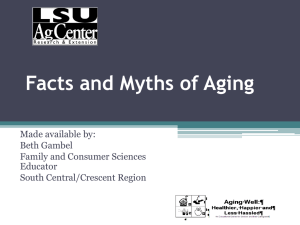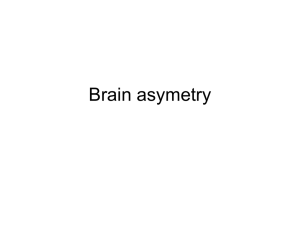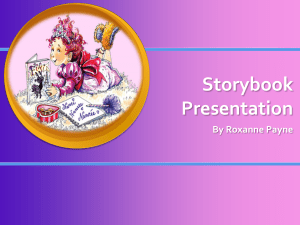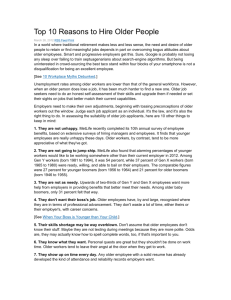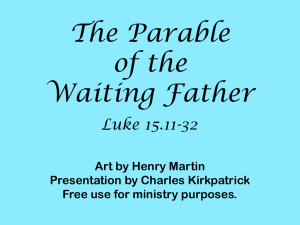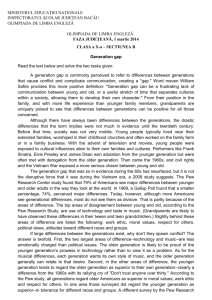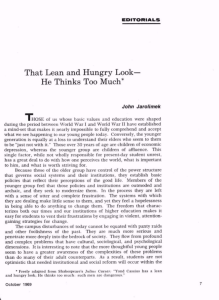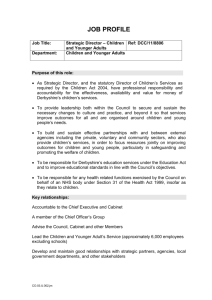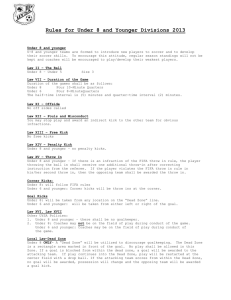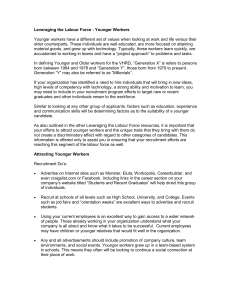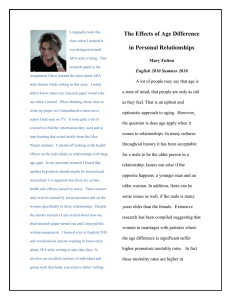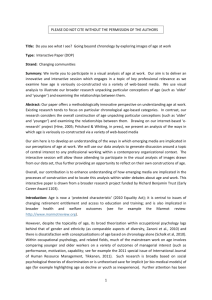Sample statements SEF - Hackney Learning Trust
advertisement
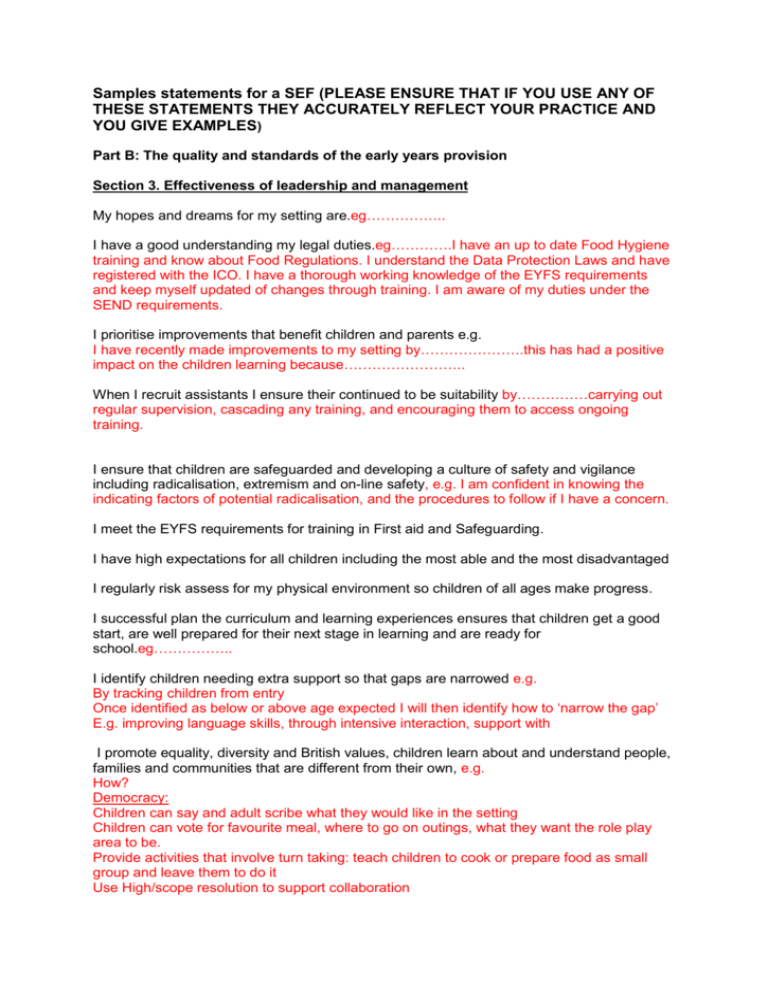
Samples statements for a SEF (PLEASE ENSURE THAT IF YOU USE ANY OF THESE STATEMENTS THEY ACCURATELY REFLECT YOUR PRACTICE AND YOU GIVE EXAMPLES) Part B: The quality and standards of the early years provision Section 3. Effectiveness of leadership and management My hopes and dreams for my setting are.eg…………….. I have a good understanding my legal duties.eg………….I have an up to date Food Hygiene training and know about Food Regulations. I understand the Data Protection Laws and have registered with the ICO. I have a thorough working knowledge of the EYFS requirements and keep myself updated of changes through training. I am aware of my duties under the SEND requirements. I prioritise improvements that benefit children and parents e.g. I have recently made improvements to my setting by………………….this has had a positive impact on the children learning because…………………….. When I recruit assistants I ensure their continued to be suitability by……………carrying out regular supervision, cascading any training, and encouraging them to access ongoing training. I ensure that children are safeguarded and developing a culture of safety and vigilance including radicalisation, extremism and on-line safety, e.g. I am confident in knowing the indicating factors of potential radicalisation, and the procedures to follow if I have a concern. I meet the EYFS requirements for training in First aid and Safeguarding. I have high expectations for all children including the most able and the most disadvantaged I regularly risk assess for my physical environment so children of all ages make progress. I successful plan the curriculum and learning experiences ensures that children get a good start, are well prepared for their next stage in learning and are ready for school.eg…………….. I identify children needing extra support so that gaps are narrowed e.g. By tracking children from entry Once identified as below or above age expected I will then identify how to ‘narrow the gap’ E.g. improving language skills, through intensive interaction, support with I promote equality, diversity and British values, children learn about and understand people, families and communities that are different from their own, e.g. How? Democracy: Children can say and adult scribe what they would like in the setting Children can vote for favourite meal, where to go on outings, what they want the role play area to be. Provide activities that involve turn taking: teach children to cook or prepare food as small group and leave them to do it Use High/scope resolution to support collaboration Rule of law: Discuss with children using books and stories about right and wrong Use a puppet who always gets things wrong Make time to discuss ‘its not fair’ issues that arise in setting. Collaborate to make fair rules and get children to paste them around room: Rules on the wall at child height Ask children to say when they have ‘done the rule and when they have seen others ‘do’ the rule. Individual liberty: freedom for all Support children in ’doing for themselves after being taught e.g. Coats, lunchtimes, care of environment. Explore feelings using a ‘box full of feelings’ Child of the week Children’s own display board Asking’ what would you like to learn? And follow up by doing it doing it Mutual respect and tolerance: Ensure that we talk about and shows children different food, clothes, dance, homes etc Daily discussion of positive images of other people Circle time talk rules teach children about respect and tolerance Daily reading and showing of images Children are well prepared for school-e.g. Children are shown and taught how to manage independently for many self-help skill, dressing, toilet and meal times. A planned PSED curriculum supports children to gain confidence and be self- awareness (see below) Early literacy skills and phonological awareness are planned and delivered as appropriate. Emphasis is given to communication and language skills I share good practice with other childminders I share practice at LA Forum meeting, Professional Development Meetings, peer support with other cms at drop ins, I welcome visits from other cms I like to visit other childminder settings, I read of PACEY, Nursery World and other publications Section 4. Quality of teaching, learning and assessment My experience, understanding and knowledge of the age group I am working with has a positive impact for the children for example…. I attend regular on training e.g. subscribe to PACEY, Nursery world Work alongside LA Childminder coordinators, who visit me regularly, observe my practice and give me recommendations to improve. I am member of the Hackney’s PACEY Childminders Quality Assurance Scheme, I use the information about children's starting points and my observations to plan for their individual needsFor example…… I assess children's progress and planning for their interests, abilities and ages including the two year old progress checks I have had training to write comprehensive progress reports I base our planning on child’s interests and needs that we have gleaned from observations and the tracker we use. (DM or other tracking programme) I have a good understanding of how children develop and learn and plan a range of activities based on children developmental needs and interests that help children progress in all areas of learning. for example Personal Social Emotional –(give at least two examples of activities for a younger and older child) Communication Language--–(give at least two examples of activities for a younger and older child) Physical--- –(give at least two examples of activities for a younger and older child) Literacy--- –(give at least two examples of activities for a younger and older child) Maths---–(give at least two examples of activities for a younger and older child) Understanding of the World---–(give at least two examples of activities for a younger and older child) Expressive Arts and Design---–(give at least two examples of activities for a younger and older child) I plan appropriately for each child including changes to activities, resources or routines so all children make good progress/ I play actively with children, getting down on the floor with them and acknowledging their contributions. For example…… I engage the children in activities across all areas of learning through ………..singing songs, role play, looking at books together, construction, counting, helping children to recognise shapes, talking to the children about they are doing and showing an interest in children's curiosity etc. . I play alongside children and bring out learning opportunities for them. For example, I make very good use of incidental learning opportunities to encourage children to think critically and to be motivated to learn, for example……. Children are given opportunity to freely explore outdoors and learn about the natural environment through growing seeds and vegetables and bug hunting. etc Supporting the most disadvantaged children with constant adult involvementI support children to meet their individual needs, always giving them the attention they need, I make regular observations and assessment and would share any concerns with parents and encourage them to seek additional support e.g. SALT team, early SEN team and the health visitor or MAT team alerted to very vulnerable child or family Developing communication, physical and personal, social and emotional skills (see above and below) Promoting literacy and mathematical skills, where appropriateFor able children the curriculum is adapted to ensure they are challenged. I involve parents in their child's learning and share information about learning at my setting and at home e.g. I send home a tip of the week sheet with skills to learn I ask parents re child’s interest in order to plan I use ‘what to expect when’ document to track progress and support progress with parents I send home rhyme or book of the week to support CLL I value information from parents and other settings- Section 5 Personal Development, Behaviour and Welfare Supporting children's emotional wellbeing through healthy attachments I Support children to be emotionally ready for transitionsI talk about how change makes one feel I prepare well in advance of the change I understand that change is unsettling and behaviour will be affected I carry out home visits and the next setting if possible and let children settle Motivating children to be excited and interested in learning (characteristics of learning) I ensure that the experiences offered to children come from their existing interests and that ‘teaching’ is focused on ‘wow’ experiences. The environment is reviewed and assessed weekly/daily so that it remains fresh and tunes into current interests/ themes. Supporting children's physical health including healthy eating and exercise for example…. I use guidance from…… Eat better start better pack http://www.childrensfoodtrust.org.uk/childrens-food-trust/earlyyears/ Use the British heart foundation Early movers pack https://www.bhf.org.uk/publications/children-and-young-people/early-movers---helpingunder-5s-live-active-and-healthy-lives I monitor children's attendance I ensure that absent children will receive a follow-up phone call if parents do not alert setting. If children regularly take time off for non-medical reasons I discuss the reasons for their absence with parents. Frequent or unexplained absences may trigger a discussion with parents. Supporting children's behaviour and helping them to understand and manage their feelings: How? Mirroring-Copying the child’s expression in an exaggerated way Reflecting-stating what you see without interpretation and talking with the child in a nonjudgmental way Conveying understanding-This is an important part of the process as it helps children develop empathy for others Containment- If an adult can’t contain them than how can a child? Name the feelings as you see them so that the child’s vocabulary of feeling is expanded I support children in developing self-regulation and independence skills-eg. Use High/scope conflict resolution skills eg Approach calmly Acknowledge feelings Gather information Restate the problem Ask for solutions and choose one Be prepared to give follow up support I enable children to do as much for themselves as they can manage for the age-e.g. set up for lunch, make own snacks, dress etc. Use High/scope plan, do review. Children learn about keeping themselves safe including the use of the internetI talk with children about safety on the roads and at home I use age appropriate ways of conveying the need to tell someone if they are being hurt The PSED programme helps children to have a robust sense of self I talk with parents to ensure they are aware of their duties
